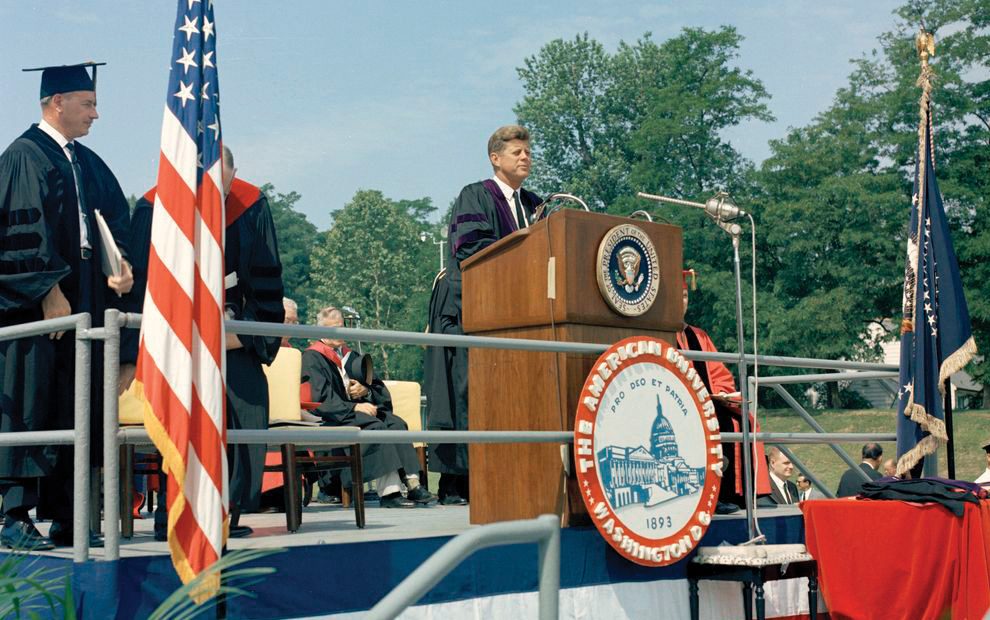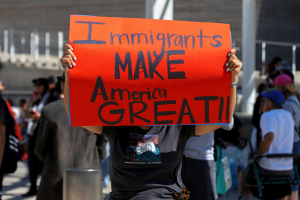Sixty years ago this month, during a commencement address at American University, a youthful President John F. Kennedy unveiled a strategy for peace during a time of profound geopolitical disquiet, a period when nuclear war seemed a far more likely outcome than an outbreak of universal peace.
In June 1963, Kennedy and the nation he led had been squaring off against the threat of global communism and the flexing of the Soviet Union, then still intent on burying the West and its capitalist project. His address came less than a year after the world barely dodged nuclear annihilation over 13 days in October, a near apocalypse that directly led to Pope John XXIII’s Pacem in Terris (On Peace). That encyclical detailed the church’s position on the immorality of nuclear war and the requirement of peace on Earth. Published just weeks before the American University address, its themes and spiritual poignancy are clearly evident in Kennedy’s urgent speech.
His address outlined some achievable steps to peacemaking and included a thoroughly unexpected outreach to his Cold War adversary, acknowledging the suffering and sacrifice of the people of the Soviet Union during World War II and imploring a human connectedness that defied political orientations and market ideologies.
Now, 60 years later, another Irish Catholic president, not as youthful, squares off against renewed threats to world peace—Vladimir Putin’s neo-imperialist dream of Great Russia and Chinese President Xi Jinping’s absolutist claim over the island democracy of Taiwan.
A tank and trench war again rumbles across Europe while continental leaders weave and dodge in feints toward odd political realignments even as they race to revitalize the components of the old-world order under NATO. Is it possible that we have learned nothing from the gruesome toll accumulated during the bloody 20th century?
At American University in 1963, Kennedy announced a plan to unilaterally suspend atmospheric testing of nuclear weapons, inviting other nations to join him in that commitment. It was a gesture that weeks later led to a big payoff with the first partial nuclear test ban treaty, setting in motion an arms reduction race that by the beginning of this 21st century has produced a vast diminishment in the global capacity for self-annihilation even as it has dangerously stalled over the last half decade.
Now a new nuclear arms race threatens as the major nuclear powers—China, Russia, and the United States—loudly contemplate “investing” billions of dollars in modernizing their nuclear weapons stockpiles and capacity. With Russia rampaging in Europe and China menacing neighbors in a part of the world it increasingly considers a private fiefdom, a world at peace seems as far-fetched a proposition today as it appeared in June 1963. But Kennedy had the courage to imagine then what a vulnerable world at peace might look like and how to take a hopeful step toward it.
President Joe Biden, confronted with familiar threats to peace, should have the same courage to imagine what peace in our time might look like. That can begin by acknowledging America’s part in creating obstacles to peace; how its own misapprehensions, misadventures, and acceptance of violent means to what it claims are just and peaceful ends have contributed to a global climate of war-making and a diabolical disregard for human suffering.
In “the final analysis” of his address, Kennedy reminded the economic and philosophical rivals of the United States and the resolute cold warriors and corporate peace resisters in Washington in 1963: “We all breathe the same air. We all cherish our children’s future. And we are all mortal.”
That is a message President Biden might consider revisiting today.
This article also appears in the June 2023 issue of U.S. Catholic (Vol. 88, No. 6, page 42). Click here to subscribe to the magazine.
Image: Cecil Stoughton. White House Photographs. John F. Kennedy Presidential Library and Museum, Boston














Add comment